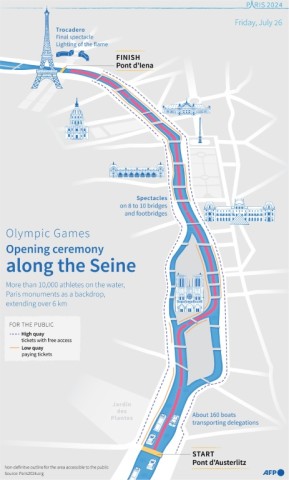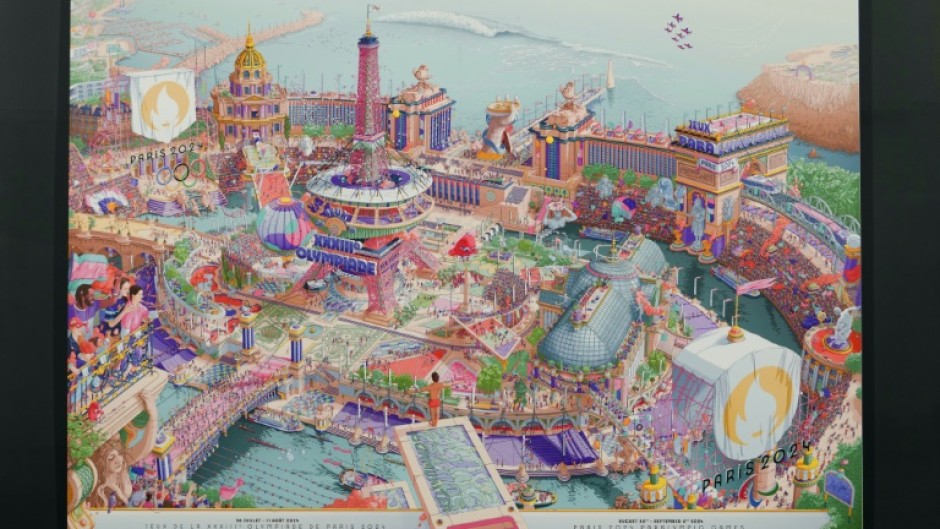PARIS - French conservatives and far-right figures fumed at the official poster for this summer's Paris Olympics, complaining that a Christian cross and the French flag were missing due to "wokism".
Those responsible for the image were "ready to deny France, going so far as to distort reality to cancel its history", Francois-Xavier Bellamy of the right-wing Republicans party wrote on X.
Top of the list of complaints about the poster, which depicts a stylised panorama of Paris, is the absence of the cross that sits atop the Dome des Invalides, the historic military complex in central Paris where Napoleon is buried.
"What is the point of holding the Olympic Games in France if we then hide who we are?" Marion Marechal of the far-right Reconquete (Reconquest) party posted on X.
National Rally (RN) lawmaker Nicolas Meizonnet wrote that the omissions must be the result of "wokism" -- a bugbear of France's far right.
Artist Ugo Gattoni's design, unveiled on Monday, features a cartoonish Paris cityscape with major landmarks such as the Eiffel Tower and a wealth of tiny details, including all 54 Olympic and Paralympic sports.
In reaction to being pulled into France's culture wars, Gattoni said he had rendered buildings "in the way they come to my mind, without any ulterior motive".
"I am not aiming to make them accurate to the originals but rather to make them recognisable at a glance, placing them within a surrealist and celebratory universe," he added in a statement sent to AFP by the organising committee.
The committee said that the posters were a "light-hearted interpretation of a reinvented stadium-city", adding that there was no obligation to include the French flag.
A surfing wave is seen "offshore of the Marseille Marina; the Eiffel Tower is pink; the Metro is passing through the Arc de Triomphe –- none of which should be the object of politically motivated interpretations," it added.
The colours of the French flag -- blue, white and red -- are present in the mascots’ rosettes, it added, and other national symbols such as Marianne are also visible.
- Security measures -
The Paris Olympics are set to take place from July 26-August 11, followed by the Paralympics from August 28-September 8.
With every decision scrutinised and discussed on social media, organisers have faced criticism before over their choices for the Games' aesthetics and merchandise in the past.

Last year, critics pounced on the fact that the official mascots for Paris 2024 were mostly being made in China, while others suggested the cuddly red triangles resembled a clitoris.
The official logo, featuring a flame, was compared to the one used by the far-right National Rally party of Marine Le Pen when it was unveiled in 2019.
Elsewhere on Tuesday, Interior Minister Gerald Darmanin said that a total of 326,000 tickets were set to be sold or given away for the opening ceremony on the river Seine, giving the exact number for the first time.
Organisers have scaled back their plans for the water-borne open-air parade -- with crowds once imagined as large as two million people -- in the face of resistance from French security services and worries about terror attacks.
But it is still set to break records in terms of size, with all previous Olympic opening ceremonies taking place in the main athletics' stadium.
"We will have 104,000 spectators on the lower bank who have paid for a ticket," Darmanin told a hearing in the Senate. "Then you have 222,000 people on the higher banks (with free tickets)."
He estimated an additional 200,000 people would watch the parade on July 26 along the river from buildings that overlook the Seine, with 50,000 more in fanzones in the capital.
The boat parade is in keeping with promises to make the Paris Olympics "iconic", with the organising committee keen to break from past traditions in the way it stages the world's biggest sporting event.
The 2008 Beijing Summer Olympics ceremony is generally considered to be the most spectacular in history, while the 2012 London ceremony, overseen by "Trainspotting" director Danny Boyle, won rave reviews for showcasing Britain's quirky side.
- by Adam Plowright

